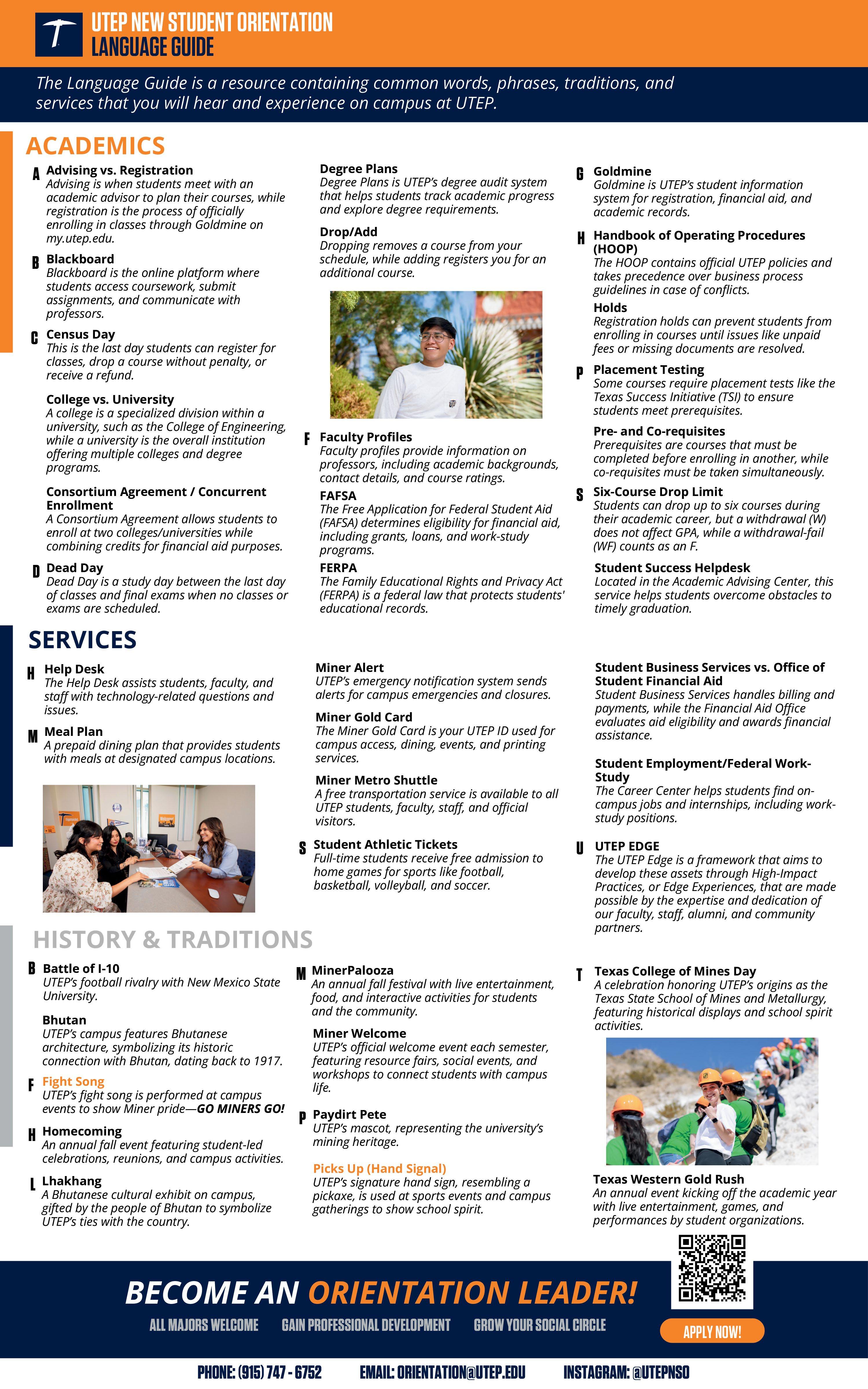








Avery Escamilla-Wendell, editor-in-chief
I was three weeks into my first semester working at The Prospector. After taking a sports story, the previous multimedia editor at the time, Adam Regalado, tapped me on the shoulder and asked if I could join him on UTEP’s student media podcast.
I had never been more excited to say yes.
Little did I know that in a couple of months, I would go from guest to host of The Prospector podcast, and to say that it’s a fun job is truly an understatement.
The reality is that hosting The Prospector podcast has been one of my greatest feats as a college student. I’ve been able to see people grow with on-camera skills firsthand, I’ve been at the center of many discussions that end in bursts of laughter, and most importantly, I’ve seen people laugh at our conversations and get a boost from the positive energy that echoes through our mics.
A multitude of reasons come to

mind why I think UTEP’s podcast is unmatched. I’ll start with the people involved. Sitting to the far right of the table in every episode from start to finish is Cameron Mason and Kristian Hernandez. Cameron, or as we at The Prospector call him, Cam, has been the living definition of a day-one friend. I met him in my junior year of high school, we were working on the school’s video announcements. At the time, Cam was on the football team, meaning he had no reason to become friends with me. That didn’t stop him though, simply because he’s a good person who’s always willing to help.
After the first budget meeting of the semester, he walked up to me offering to be my co-host, introducing a tandem non-existent in the previous years of The Prospector Podcast. Plus, he also takes tough jokes well. Cam if you’re reading this, I promise episode three is the last time I’ll mention your last relationship, however, this story doesn’t count.
Kristian, on the other hand, I’ve only known this semester, but it feels like he’s been a friend for longer. I got to know Kristian at first because he was always willing to lend a helping hand, he was

always at the office and had great advice that he’d share with me.
With a media background from EPCC, Kristian’s credentials are far more expansive than any title put on him can encapsulate. He knows camera work, annunciation, directing and podcasting to a tee. What he doesn’t know, which is very few, he’s always willing to learn
and grow.
The most important part of our chemistry that makes the podcast distinct in the best way, is that we recognize that we’re college students. Our voices deserve to be heard, and we deserve to have fun. We’re always open to talking about serious issues, but we can’t ignore the fun topics, or slight digs at each other that make the experience fun. When going back and listening or watching some of the previous seasons, the tag “for the students, by the students,” has an omnipotent presence. I’m glad to say that ideology is still alive and well.
Upon starting your journey at UTEP, know that at The Prospector Podcast, there will always be an open seat at the table. Our arms will always be extended to welcome new listeners and new guests. So just like we do at the table, don’t be scared to speak up.
College and university life can often seem overwhelming and stressful to new students. It’s a big transition from previous stages of life to a new journey. Students will often have to become comfortable in new settings and environments.
Chevar Gordon, a criminal justice major, found the transition to be difficult at times and suggests that students should realize the different setting sooner rather than later.
“Despite it being your own pace and not as strict as high school, be prepared to lock in. You’re not being monitored, so you got to have better time management,” Gordon said. “There’s no teachers to remind you about your homework, so you have to do it on your own.”
Time management and keeping priorities in order throughout university is crucial. Not only do students have classes to worry about, but many have jobs, extra
curricular activities and other responsibilities that may be on their minds. It’s important to figure out a schedule that works for them and try to stick to it as best they can.
However, unexpected events and unforeseen circumstances may arise, but students must remain strong willed to keep moving forward. Students should take advantage of all the resources available to them such as the counseling center, food pantry and other support services. With a resource such as the counseling center, mental health should be a top priority in all students lives. It is unreasonable to expect to excel academically or in other areas of life if they don’t feel okay. Taking a mental break, breathing and relaxing is important, everyone needs a break every now and then.
Students entering college may also believe that the path they choose at first is the one they are meant to follow, but a good thing to consider is that it is okay to change their
Montero, Reporter
SalmaPaola Baca, Photographer
Diego Cruz-Castruita, Photographer
ADMINISTRATION
Veronica Gonzalez, Director
Crystal Hinga, Assistant Director Isabel Castillo, Accounting Specialist
Amy Ontiveros-Bocanegra, Administrative Associate
mind during their time in school. Changing majors may be beneficial for them if their mindset or goals change throughout the year.
With that in mind, students should also be aware of their degree plan and what classes are needed to graduate. Ecology and evolutionary biology major Persephone Saavedra, believes that students should know their academic path once selected and be sure to double check it.
“I feel that people should know more about how to run a degree plan because our advisers can sometimes lead us on the wrong track,” Saavedra said. “Run a degree evaluation and figure out what classes we need next.”
With everything going on in a college student’s life, a social life is quite important as well. While you may find yourself to be very busy and maybe even losing old connections, there isn’t an issue with this. Making friends and companions is part of the journey
ADVERTISING STAFF
Adrienne Garcia, Account Executive
Ana Flores, Advertising Coordinator
Ryan Leblanc, Advertising Coordinator
Elias Segura, Advertising Videographer
CONTRIBUTORS
Jazmine Gracia
Kristian Hernandez
H. Catching Marginot
Cameron Mason
Daniela Ordaz
Athan Sano
Victoria Valdez
Vianah Vasquez
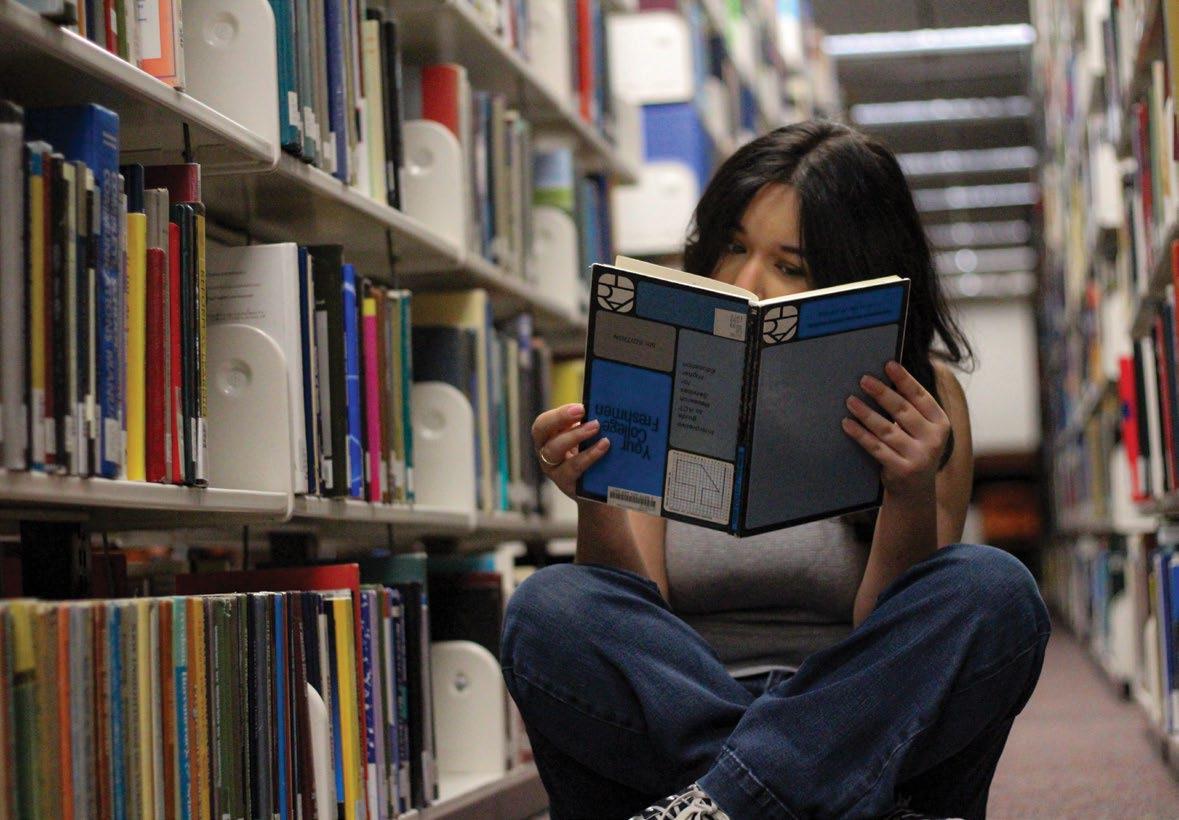
at a university and those friendships and connections will come when the student needs them most. While the life of a university student may not be easy, it is an important step in a person’s life. Students not only learn and work towards a career that they are preparing for, but memories and moments that will last a lifetime are made. You aren’t in college forever, so it’s important to make every single day count.
Montero is a staff reporter for The Prospector and may be reached at jemontero@miners.utep.edu
To the young journalist entering college: don’t be fearful of your new surroundings–you are not alone. UTEP Student Media and Publications is here for you. Whether you have a background in reporting, photography, yearbook experience or no experience, if you want to step foot into the world of media, The Prospector and Minero Magazine are a chance to continue or start your journey into the world of journalism.
Student Media and Publications houses two publications. The Prospector is a standard newsroom producing a monthly newspaper, web content, social media, multimedia and more. Our sister publication, Minero Magazine, is a bilingual, semester based published magazine where reporters and photographers write and take photos for a specific theme and or idea. Both publications are great outlets that produce amazing content and share stories that students may be unaware of.
Now you may be wondering, ‘Who creates these papers or magazines?’ Well, it’s us. We are a student-led publication which means students work together in different positions to create these wonderful sources of content and information. We have a director, adviser and other staff that are working through UTEP to help us students be successful and create physical media.
So, what do you need in order to be a part of our team? The qualifications include being a fulltime student with a GPA of 2.5 and above. Having work examples such as your writing, photography and videography are helpful but not mandatory. Students of any major can work with us as well. Many young journalists come in not knowing where to start or not having any experience.
That is why we exist–to help you receive the experience you need to gain as a journalist. If you are shy, afraid or consider yourself awkward, that does not mean Student Media and Publications is not for you. We understand that everyone is different, and applicants may have a variety of backgrounds,
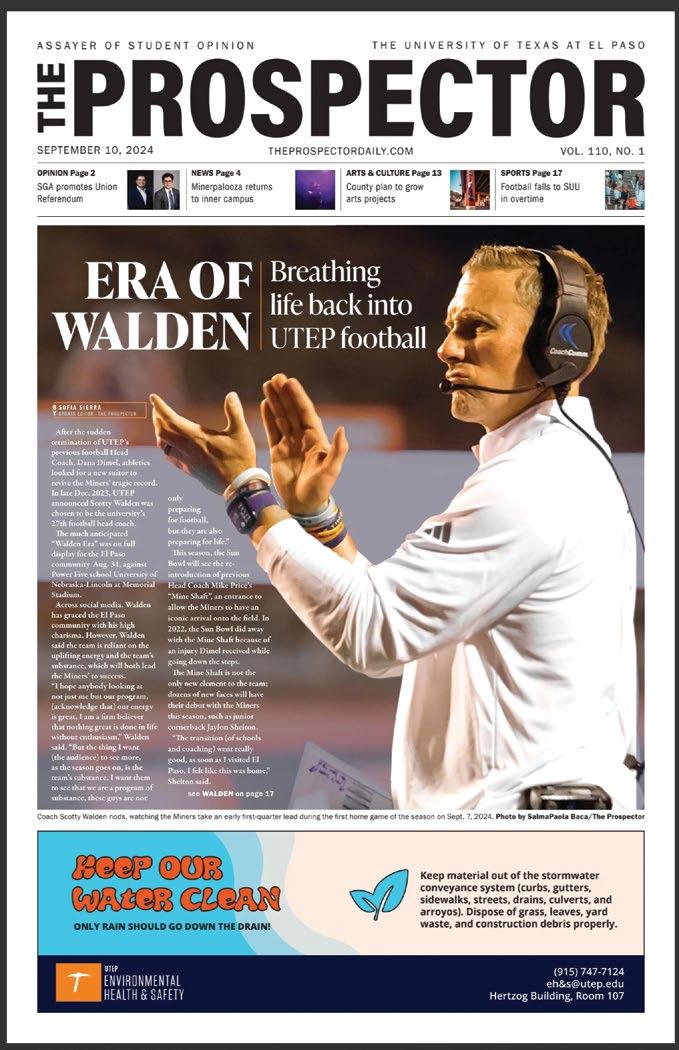
but maybe one day, you will be the editor-in-chief running either publication. If reporting, photography, videography, social media or anything in the realm of media is your passion, come down and check us out at Student Media and Publications. My team and I are excited to see you be a part of our staff. For more information, you may check us out on Instagram @utep_prospector or @utepminero. To apply, you must fill out an application on MineTracker or simply come into our office located at the Union Building East, Room 105. Hope to see you soon.
Avery Escamilla-Wendell is the editor-in-chief at The Prospector and may be reached at amescamilla@miners.utep. edu or on Instagram @by_avery_escamilla.

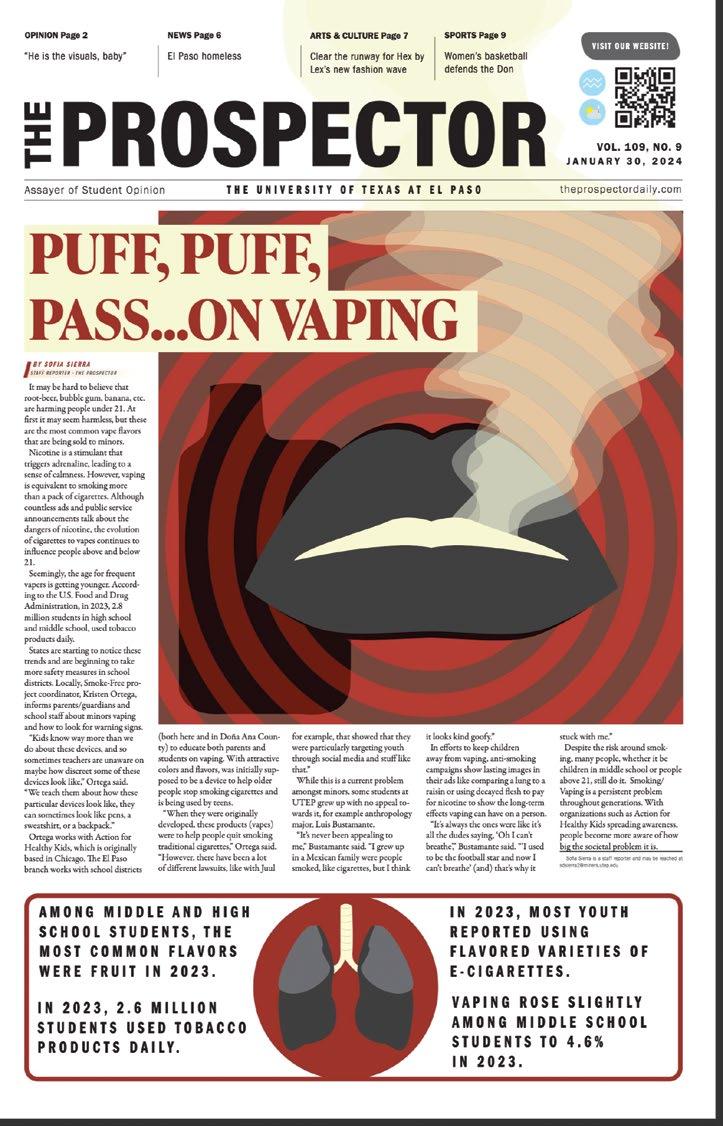
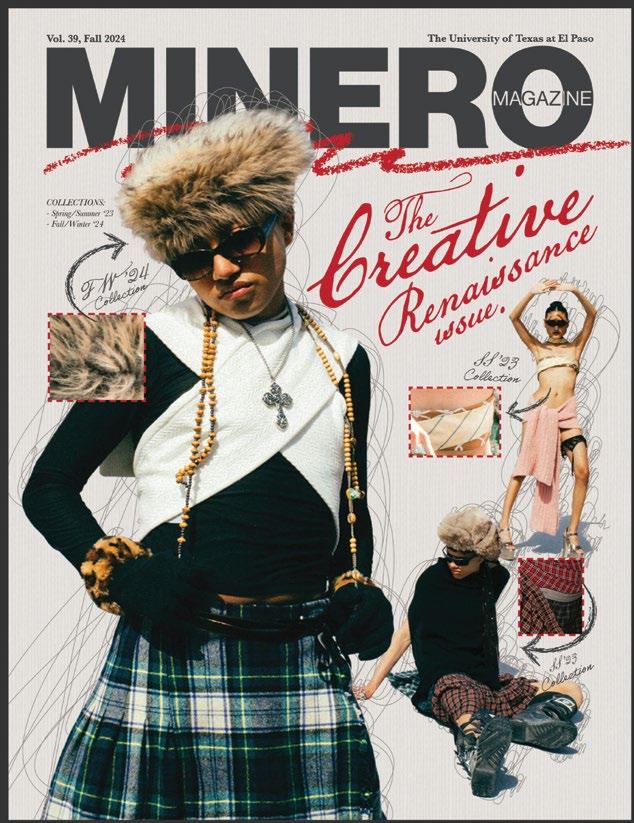
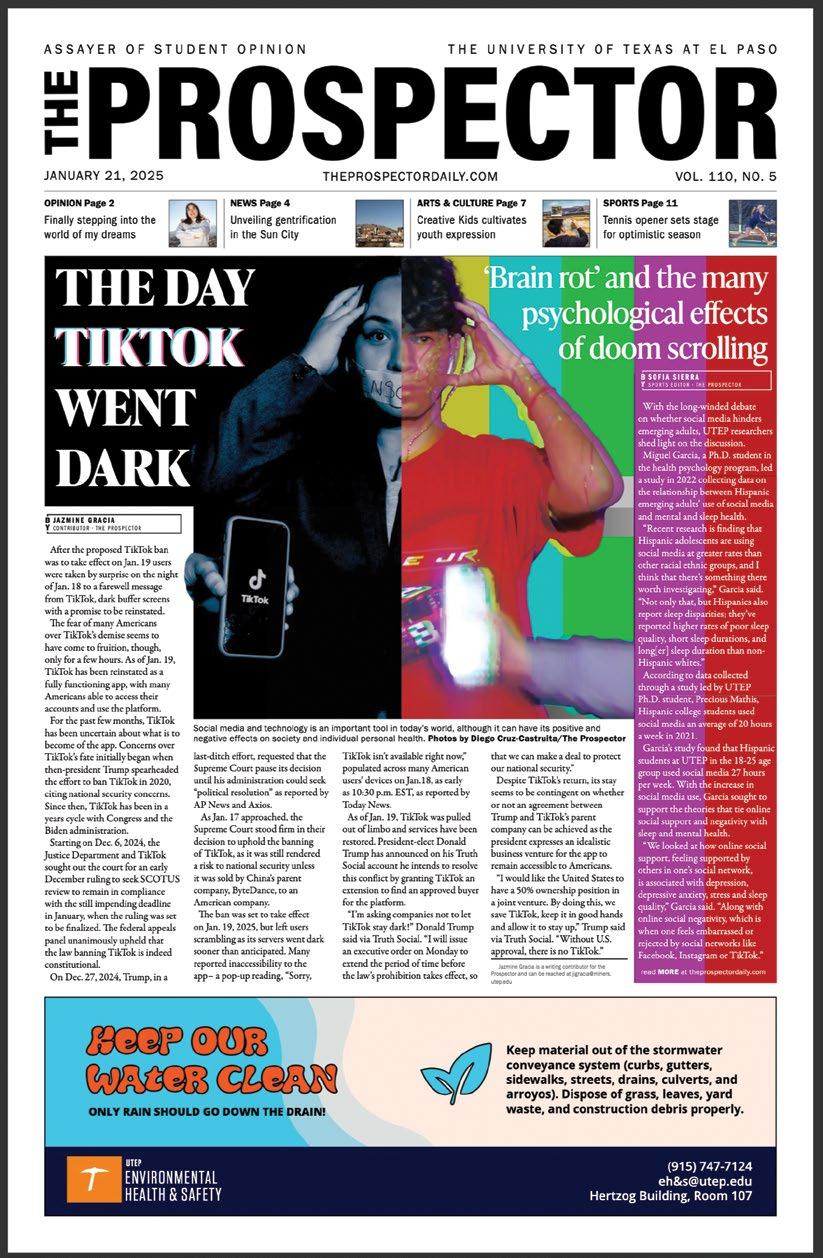

The first three years of my college experience seemed unappealing to most. The glamorous college life projected on big screens and story books was something I longed for, to say the least.
My days usually started at 6 a.m. From there I’d get ready in uncomfortable slacks and button ups to run back and forth between campus and my office job. One semester I worked a second job, and my home became a hotel where I’d shower and sleep. Most of my meals were eaten on my drives between each location.
The envy for the fortunate kids who haven’t worked a day in their lives runs deep for many college students who must make money to survive. The fear of missing out (FOMO) becomes a very real issue to those watching parties through Instagram stories while working a double.
After several years of being too busy to get involved in campus life, I became envious of my friends who didn’t work through college.
In my third year, and first semester at the University of Texas at El Paso (UTEP), my dearest grandmother passed away suddenly during finals week, and I was sure I was going to lose it.
If I had to give advice about how to navigate your experiences through college, I would say the experiences differ drastically through who you are, where you are and where you come from.
The culture in El Paso ties in so closely with the students at UTEP. There is a community built between students based on the positives and negatives of attending UTEP, one of the country’s largest Hispanic-Serving Institutions, that also happens to reside right on the southern border.
While juggling the added stressors of school and social life, this may make students feel isolated

in their college years, but it is not rare to find a peer who is living in similar circumstances.
Having a great college experience does not have to mean going out to “college nights” every week, joining Greek life or even hanging around campus events. The college experience is about building a community, wherever you find
yourself and using it to help each other reach goals (or just having someone to make you laugh a bit when you need it). Not everyone has the luxury to work an unpaid internship or take time off for student events, so finding support in the environments you are mostly in is recommended.
Although the dreaded office job I had my first few years of college made it hard to partake in “normal” university life, I now realize it was normal and has happened to most of my peers. When I lost my grandmother after my first semester at UTEP, my college-aged coworkers were the people who stopped me from falling apart.
Although it’s very easy to take the hustle, classmates and coworkers for granted, they are what make the journey. It’s important to lean on the available resources for support through college.
My advice to someone who feels the FOMO because of financial restraints or other factors is to
embrace what UTEP’s campus has to offer more. A club with your interests could be used as stress relief when participating in activities with people who are like you. If you can’t join a club, sitting in the library to do homework or walking around campus, offers a soothing immersion into college life that won’t feel as obligating. UTEP also offers services such as the Student Health and Wellness Center. This is for students who need accessible care. Another program is the Student Support Service Program where students may apply to that assists them in their education regardless of socioeconomic background. Working through college may be rigorous and coworkers can be difficult, but finding the silver lining and support in the environment around you will help you get through the FOMO and tough weeks.
The transition from high school to college for incoming students can often be intimidating and seem overwhelming at times. Students might even feel the weight of the world is upon them.
Educators who embrace new students every semester at the University of Texas at El Paso (UTEP) have once been in a lecture hall before, studied at the library for an exam. These educators spoke to The Prospector to share insightful advice to new and returning Miners.
Victor Sanchez, a UTEP master’s student in the business administration department and now a teaching assistant of political science, found that during his time as an undergraduate, studying for classes and juggling multiple responsibilities at once was his largest obstacle to overcome.
“It’s a lot of time management, I will say try to learn different ways of studying and see what works for you, especially with the hard classes. Because it really becomes a struggle, especially if you’re used to just kind of zooming through your classes,” Sanchez said. “You really got to sit down, take the time to go through the material, look at the resources available for you and just take it slow and see what works.”
The workload throughout college can become overwhelming at times, but there are resources provided by the university to help students succeed in their classes.
For those transferring directly from high school, where most
necessities are provided to students, the shift to college provides a taste of adulthood.
Teaching assistant for public speaking Weston Stagner, advises students to stay on top of their finances and readings.
“My college experience started off rough, because you’re transitioning from high school, I was really struggling. With parking and paying for things as a college student, a lot of students have that kind of thing in common,” Stagner said.
As for academic work, Stagner believes that if students read the required material and do not put it off, then success will surely come their way.
“If you can read the textbooks for your classes, you’re going to separate yourself from your peers tremendously because a lot of people don’t read those things. They just go to lectures and they’re just physically there, but not mentally there,” Stagner said.
College may seem stressful, but it can also be a great place for many.
Dr. Claudia M. Boyd, professor in the communication department, relishes looking back on her time at UTEP, a place she considers to be a second home.
“They gave me compassion for not being the perfect student and still learning and getting to where I needed to get [and] even more grace when they accepted me into the graduate program,” Boyd said. It was an honor for Boyd to return to UTEP to now be able to educate and mentor students of her own.
“I was now going to be able to give back to my students and it’s such a
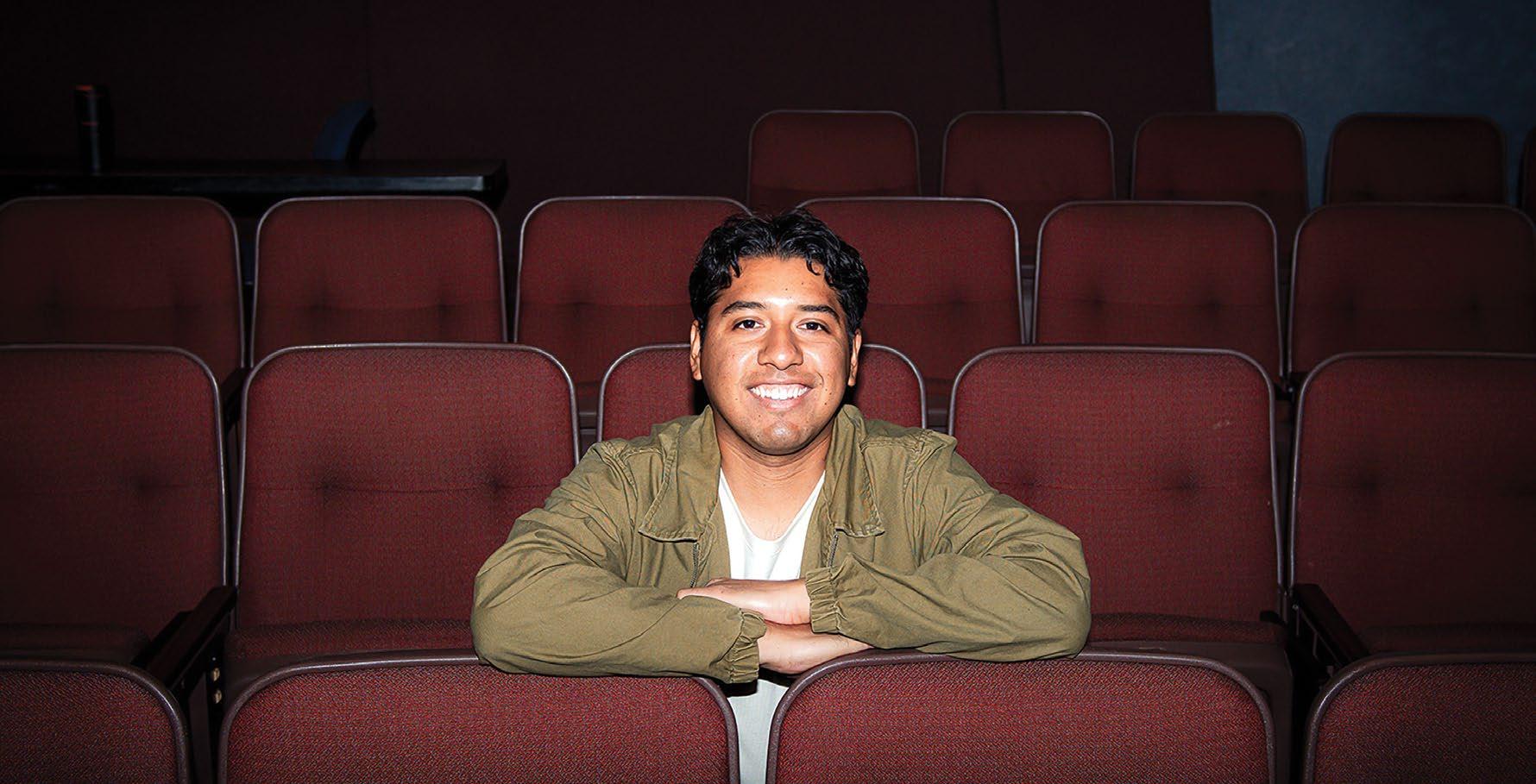

blessing and a privilege to be able to be here at my alma mater, giving back to the place that gave me what I got. It’s a great feeling,” Boyd said.
Dr. Boyd’s advice for incoming and current students is to be aware of their mental health.




“Be kind to yourself, first and foremost, because I think we’re really hard on [ourselves]. You’re not going to know everything that you think that you need to know it’s going to take time,” Boyd said. Despite the common first-year-
student struggles, UTEP is a university where students can find their place and learn from professors who have gone through the same experiences as them.
Montero is a staff reporter for The Prospector and may be reached at jemontero@miners.utep.edu
There is a spark of something beautiful when one feels they have assisted another. This spark is built on pride, assurance, or the simple feeling of a good deed, and that spark is what The University of Texas at El Paso peer leaders share with others.
(UTEP)’s Entering Student Experience (ESE) Peer Leaders is an organization focused on guiding students who are just starting at UTEP through the assistance of peer leaders. But it paints a bigger picture, with students themselves being peer leaders. It brings a source of self-reflection, fulfillment, engagement and community.
Jolette Robles, a sophomore majoring in psychology and Daen Bermudez, a junior majoring in computer science, are both in their second semesters serving as peer leaders and support students.
“Our mission as peer leaders is to foster a good environment for our students, we want them to feel [a] sense of belonging in college [and] help them grow in their professional and personal life,” Robles said.
These leaders achieve this by being present in a University (UNIV) 1301 classroom setting alongside
new incoming UTEP students. Here, they accommodate their abilities to match the teaching style of the professor to engage their audiences with presentations on class curriculum, time management, mental health and university navigation. All of which focus on UNIV 1301’s four pillars: identity, belonging, aspiration and agency.
However, their work is not just through presentations and resources. Peer leaders have the opportunity to work closely with the students they are assisting, either one-on-one or in groups. They provide assistance with the workload and give advice on a deeper level than an appointment with an adviser.
“One time I was talking to a student [who was] studying business to create his own clothing company. I told him about courses [he] could take, theater courses that you can learn about costuming, organizations that are focused on fashion. You can really notice when they’re grateful for the information you give. That is important,” Daen said.
If they don’t know the resource, the community at the Peer Leader’s office is full, creating an ever-looping cycle of information between the members.
LEAH AUSTIN B Y
REPORTER THE PROSPECTOR
The University of Texas at El Paso (UTEP) is one of the largest Hispanic-Serving Institutions (HSI) in the United States. The university focuses on a variety of dimensions to support its Hispanic and Latino students, a demographic that makes up 84% of its student body.
Director of the Office of Provost and Academic Affairs Dr. AnneMarie Núñez shared insight into what makes UTEP a standout HSI.
“In terms of how it operates as a Hispanic-Serving institution, UTEP really focuses on a variety of dimensions to support its students. One of the ways that a lot of staff and faculty talk about is meeting students where they are. They talk about supporting students with high impact practices that are demonstrated to promote student success and positive academic and non-academic outcomes, and authentically serving students,” Núñez said.
An HSI is defined as an institution that enrolls at least 25% full-time undergraduates of Hispanic background. HSIs were established in 1992 under the
terms of educational development.
“HSIs were established in 1992, and there were only 189 then. There are now 600. That reflects the growth in the Latino population and that demographic.
Currently, [UTEP is] only one of 233 HSIs that are also highly active research universities, and one of the few that was an HSI before it got that denotation,” Núñez said.
As an HSI, UTEP focuses on five important principles to support its students: academic support, financial support, social support, cultural support and career support. These areas of focus contribute to what Núñez refers to as a “culture of care.”
The first focus, academic support, is characterized by promoting positive outcomes for students.
“It’s what some of my colleagues and I and some of the research I’ve done call ‘servingness.’ That’s just creating really culturally affirming environments for students to thrive. [This means] promoting positive outcomes like graduation, persistence, GPAs, year-to-year retention in the major. Also, nonacademic outcomes like leadership qualities, social consciousness [and] community engagement,”


also supports students financially, hailing itself as the most affordable research university in Texas. According to the Institute for College Access and Success, half of Latino students rely on Pell Grant funds to attend and complete college. At UTEP, over 69% of undergraduate students receive financial aid.
“[UTEP is] really trying to organize departments and units so that they promote academic support of students and financial support. For example, offering students on campus jobs. It could [also] mean in and out of class peer learning opportunities, tutoring, experiential learning, internships [and] social support,” Núñez said.
Career support is exhibited by the opportunities afforded to students while earning their degrees and after. This means preparing students and guiding them into the workforce and providing meaningful degree plans that can translate into student’s chosen office, company or enterprise.
“It’s important to link students with the kinds of experiences that are going to show them professional pathways, whether that be workshops on how to do
interviews, an internship in a local company or even with a professor doing research,” Núñez said.
The last two principles are cultural and social support. These two factors are what separate HSIs from other types of universities, and what draw Hispanic and Latino students to these institutions.
“In terms of social support, faculty try to get to know students’ names. UTEP offers faculty, in the orientation packet, a little booklet on how to pronounce names correctly. That kind of environment helps students feel more comfortable, feel more seen and less out of place,” Núñez said. “Cultural support that’s understanding. UTEP has a highly bilingual population [a] capacity to navigate multiple languages and live in multiple cultures is an asset that students bring that’s [going to] translate well into the workforce.”
Despite growing awareness and funding for HSIs in recent years, some fear President Donald Trump’s administration may halt the progress the community has made regarding the accessibility of higher education. With recent “crackdowns” on DEI, immigration, and other policies
that heavily impact Hispanic American communities, the future seems unpredictable.
“Things are changing day by day. That makes me hesitant to assess the impact when every single day, the situation is changing. What I hope is that the importance of HSIs will not be lost,” Núñez said.
“What I hope is that there will be lawmakers and policy makers who recognize the importance, as demonstrated in evidence, that HSI’s contribute to the U.S. workforce, and that they contribute to professions in which Hispanics have been underrepresented, like science. [I hope] they will see that the interests of HSIs and that what HSIs do are congruent with the economic and global competitiveness of the United States.”
HSIs and the education they provide for Hispanic and Latino students are imperative to the American landscape. They provide a community for students to receive a meaningful education in a supportive environment.
Leah Austin is staff reporter at The Prospector and may be reached at lsaustin@miners.utep.edu
Many students at the University of Texas at El Paso (UTEP) work part-time and full-time jobs while going to school. Some indulge in internship opportunities; others work hourly jobs on the weekends for some extra cash. However, some students have discovered the benefits of working one of the varieties of on-campus jobs that UTEP offers, which are also resume builders for a student’s career. UTEP has jobs that fit students’ wants and needs. The opportunities on campus range from hourly positions to internships, from tutors to assistants and much more to choose from.
Many of these positions involve helping other students and staff, whether it’s through being a peer leader and leading students through
orientation or assisting professors in their research.
Computer science student, Samantha Dominguez-Flores works at the Information Center located on the first floor of the Union’s east wing and is a customer service representative that primarily tends to students.
Dominguez’s duties involve answering UTEP students’ questions on events, directing them to correct departments and helping student organizations by booking rooms for their meetings.
The Information Center provided Dominguez with her first job, and she says it couldn’t have been better.
She says working on campus has taught her lessons to apply even outside the workplace and leaves her satisfied when she gets to be helpful to others.
“I love my job,” Dominguez said.
“It teaches you to be punctual,
how to be responsible about your workspace, and how to be kind towards others. I am the first person a new student sees when they come to ask for information about UTEP so it’s important to have them feeling satisfied with their service. Although it may seem like a small job, it goes a really long way to be as kind and as useful as you can.”
Dominguez’s job also offers a healthy balance between her work and school life. She said her job allows her to work on schoolrelated tasks once all her duties are complete, which is a similar experience for many students who work on campus.
On top of all the rich experience that Dominguez has gained, she’s also had the chance to make unique connections by networking.
“I have made the best connections at work. I have met the most
amazing people in my life. I have a lot of new friendships since I started working there and that’s also a plus,” Dominguez said.
UTEP jobs are not just limited to enrolled students, but some recent graduates have access to work opportunities after graduation.
2024 graduate and soon-tobe master student Brianna Cooper works for The Center of Community Engagement (CCE) as a campus compact AmeriCorps vista member.
Her primary role is to address food insecurity by creating and enhancing initiatives that help all kinds of people on campus. Before her current position, she was a work study for CCE.
Cooper’s connections from her work study position opened doors for her which led to her current title. She stresses the importance of networking through student
jobs and using them to guide one through their career.
“For new students I encourage you to take advantage of internships and work study opportunities if you can,” Cooper said. “They help you get a sense of what your desired field looks like in the real world, enhance your resumes, help you network with individuals that could potentially open doors in the future and overall, they can end up being memorable experiences that enhance your education.”
Student jobs can be found on websites like MineTracker and Handshake and can also be presented through networking with professors and other students. On campus jobs can offer viable work and life experience to students while providing the extra benefits of social life and community.
Jesie Garcia is a staff reporter and may be reached at jlgarcia36@miners.utep.edu or on Instagram @ empanaditawrites.
THE CENTER FOR ACCOMMODATIONS
THE CENTER FOR ACCOMMODATIONS AND SUPPORT SERVICES IS AT YOUR FINGERTIPS WITH
THE CENTER FOR ACCOMMODATIONS AND SUPPORT SERVICES IS AT YOUR FINGERTIPS WITH AND
CENTER ACCOMMODATIONS AND ACCOMMODATIONS IS YOUR FINGERTIPS THE SUPPORT AT FOR AT WITH THE FOR AND SUPPORT SERVICES IS AT YOUR FINGERTIPS WITH SUPPORT WITH
CENTER IS YOUR FINGERTIPS AND SUPPORT SERVICES IS AT YOUR FINGERTIPS WITH AND
CENTER ACCOMMODATIONS AND IS FINGERTIPS THE ACCOMMODATIONS AT YOUR THE
CENTER FOR ACCOMMODATIONS SUPPORT FOR AT WITH THE CENTER FOR ACCOMMODATIONS SERVICES FOR SUPPORT FINGERTIPS WITH CENTER SERVICES IS YOUR AND
CENTER ACCOMMODATIONS AND ACCOMMODATIONS AND SUPPORT SERVICES IS AT YOUR FINGERTIPS WITH THE SUPPORT AT FOR AT AND SUPPORT SERVICES IS YOUR FINGERTIPS WITH WITH THE FOR SERVICES


AIM allows students to access or request services online and from the comfort of their home 24/7. Use your UTEP login to request accommodations, check your status or apply to be a notetaker. AIM is for faculty as well!

cassportal.utep.edu cassportal.utep.edu cassportal.utep.edu cassportal.utep.edu cassportal.utep.edu cassportal.utep.edu cassportal.utep.edu cassportal.utep.edu cassportal.utep.edu cassportal.utep.edu




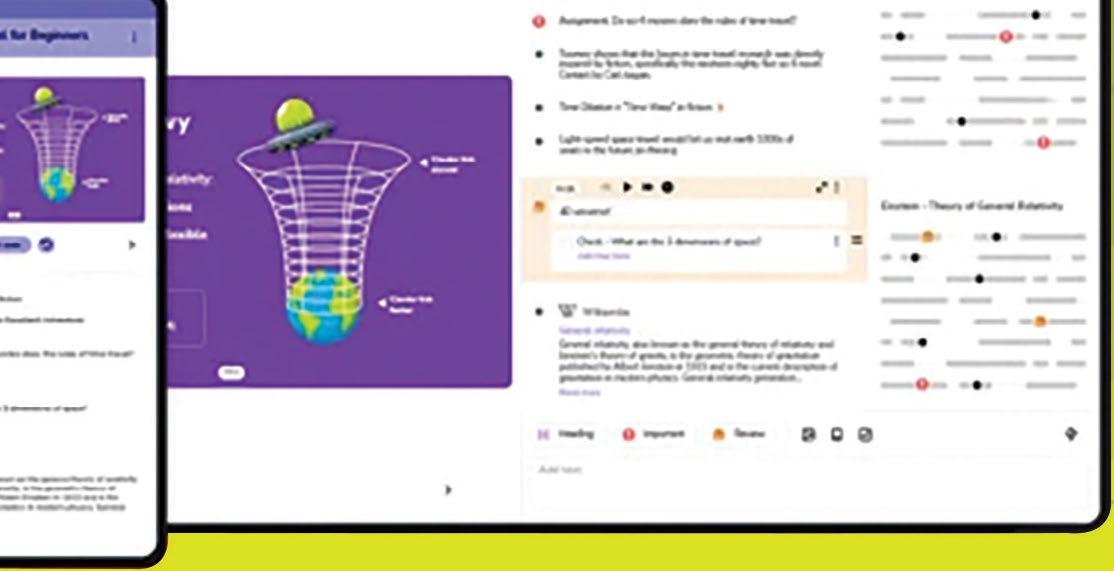

Glean is an app offered by CASS that helps students record and transcribe class lectures, take notes and more to guarantee students a successful learning experience.
Students interested in using Glean must be registered with and approved by CASS for this accommodation.
Alyda Muela, editor
Many prospective students hesitate to enroll at the University of Texas at El Paso (UTEP) due to the fear of feeling “stuck” and missing out on opportunities to see the world. However, a student’s experience at UTEP is what they make of it, and studying abroad is a fantastic opportunity to broaden horizons and embark on a journey one never expected.
Studying abroad often comes off as a glamorous yet intimidating experience that may seem unattainable to some. But, with the proper resources offered by the Office of Study Abroad at UTEP, students can receive guidance on every step of the process.
For senior psychology major, Sujey Sandoval, the guidance she received from Professor John De Frank, co-faculty and media producer for the faculty-led program “Layers of Rome,” made all the difference.
“I set the goal of studying abroad, but I couldn’t find my way until I took classes with De Frank,” Sandoval said. “I got information from him, and he helped me a lot with filling out the paperwork.”
There are many different study abroad programs that UTEP offers, which fall into three categories: exchange, third-party and faculty led. According to the Office of International Programs and Study Abroad on the UTEP website, exchange programs are when “UTEP has agreements with a number of universities throughout the world which allows you to attend a foreign university while paying UTEP tuition.” This opportunity can make studying in South Korea, China or even Peru a much more affordable option.
Third party programs are offered by an outside party independent from the university and students who choose to participate in such programs will need to pay program fees directly to the providers. Finally, faculty-led programs allow
Tell me if you’ve heard these before: “How did you pick your major?”, “How many scholarships do you have?” or “Do you really want to go to UTEP?”
If you have, or if you eventually do, know that it’s okay to not have the answer.
Let’s go down the list and prove why not being fond of your major, or feeling as though UTEP isn’t the right campus, are beliefs that don’t carry as much weight as social pressure says they do.


UTEP faculty or departments to offer courses abroad as part of university curriculum. These types of trips are often short-term.
Annya Hernandez, a sophomore criminal justice major, went the faulty-led route and applied for the “Study Abroad in Criminal Justice: London” program, where she studied in a UTEP classroom and the capital of England.
“We had in-person classes for
“What if I picked the wrong major or minor?”
If you’re in this situation, first take a breather. Then remember that it’s more than okay to go to college and not know what you want to do for the rest of your life.
I’ll go one step further and say that it’s an advantage because you get to try more. You can always choose to change your major or for the brave students, double major. Scared that you might choose your major too late? Don’t be, because there are easy ways to avoid the situation. I don’t want to sound like your guidance counselor or
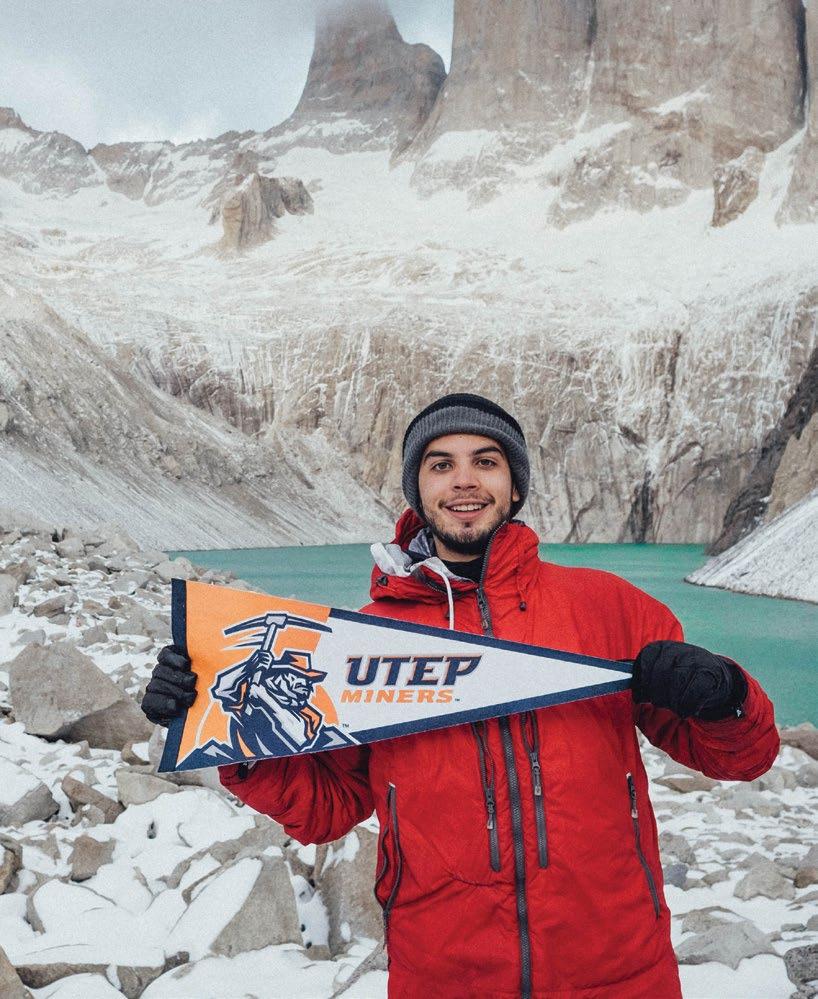

two weeks where we were assigned to read the book and answer discussion board questions,” Hernandez said. “Then we would spend another two weeks in London visiting the Tower of London, prisons, had presentations and a forensics activity.”
Studying abroad offers students opportunities that may have once seemed out of reach.
“I was happy when my application
your orientation leader, but all it takes to avoid lategame changes is to talk to your advisers. By telling your advisers how you feel about your major, they’ll be able to sign you up for classes that aid in completing your basic curriculum requirements, while buying you time to think about your options.
Consider talking to professors from different colleges too. Something beautiful about
was accepted because I would be the first of my family to study outside of the continent and learn a third language,” Sandoval said. “I felt very proud that something so distant to me as a child, was now so close to living it. I want to keep traveling the world while also feeding myself with knowledge.”
Aside from giving students the “travel bug,” an international learning experience can offer
growth in personal, academic and professional aspects. Flying overseas and visiting Rome, Italy for the first time was monumental in Sandoval’s personal enrichment, especially as she had previously feared trying new things.
“This experience allowed me to discover a part of myself that healed several wounds and brought me a lot of peace,” Sandoval said. “Academically, it helped me advance in my career and gave me interest in additional projects.”
While studying abroad offers an invaluable educational experience, there is still time to enjoy the travel and explore new destinations.
Traveling to London was Hernandez’s first international trip, but the jet lag and time zone change didn’t stop her from enjoying her free days with her classmates.
“My roommate and I got used to having most afternoons free, so we explored a lot. On my free days [and] afternoons, I was able to see Karol G’s concert, Tom Holland star in the “Romeo and Juliet” play and take a train to Scotland for my birthday,” Hernandez said. “I learned a lot through this program and [was] still able to explore a foreign place.”
If studying abroad sounds exciting, don’t hesitate to utilize the resources provided by the university. UTEP offers resources and programs to help make studying abroad more attainable for students who wish to explore.
The UTEP Office of International Programs and Study Abroad can be found in the Union East in room 203 and online at https://www. utep.edu/student-affairs/oipsa/. Evelyn Palma is the web and copy editor for The Prospector and may be reached at empalma@miners. utep.edu and on Instagram @evelynp.media.
UTEP is how accessible professors are, and their willingness to help students. So, you should use that unmatched trait to your advantage.
“I need more scholarships and money to pay for school.”
You’re not alone, because a
majority of college students battle this problem.
Here’s the good news, UTEP is the best in Texas for having the most students graduate with no debt and ranking at 15th in the nation. The area to qualify for grants from the university is
wide, especially after the “Paydirt Promise” program was extended to households earning less than $100,000 in Fall 2025.
It’s a given that not everybody can receive financial aid. So, if you fall under that group, or just want some more cash, here are your options.
First, apply for scholarships.
Understand that scholarships aren’t limited to the websites your high school directed you to. UTEP’s Office of Scholarships helps in pointing out options that best work for you, whether it be a traditional scholarship or a club that has awards for its members.
Speaking of the scholarship office, they’re in charge of the undergraduate fellowship program. The program focuses on preparing you in your freshman or sophomore year to apply for nationally competitive scholarships in your junior and senior years and awards a stipend.
We can’t ignore the importance of a job. A majority of UTEP’s job listings are available on either Handshake, or MineTracker and if you apply to a good number of listings, your chances of scoring a job on campus are likely.
“I’m not sure UTEP’s the right university for me.”
Straight out of high school, everyone’s racing to leave their hometown, and the local university tends to get a bad reputation from students because it’s located in the same city, they have grown up in.
Know that simply because UTEP is in your hometown, does not take away the legitimacy or credibility of the university in any way. In terms of academia, UTEP is rated as an R1 institution, or in other words, is placed in the top 5% of research productivity in all the U.S. Even better, UTEP is one of the few schools, not only in the UT system but in the country, that lets freshmen and sophomores gain hands-on research experience. Most schools make you wait until the end of your undergraduate career. A distinguishable characteristic of UTEP compared to other colleges is the people that make up the campus. Every single person, whether a student, professor or board member is accessible and is willing to have a conversation with you, and aid in your development as a student.
Don’t think for a second that just because you’re staying in the 915, your college experience is hindered. UTEP has professors ranging from New York City to the Netherlands, and Amsterdam.
Your curriculum and professional base are by no means going to be degraded by attending UTEP. It’s got more room to grow because of the number of opportunities offered by the university, either through professors, programs, clubs, or all three.
UTEP has way more to offer than what first impressions may communicate. All it takes is an open mind to see the heights you can reach by being a Miner.
For newcomers, the college experience can be an intimidating endeavor –filled with nerves, excitement and curiosity as to what this newfound chapter awaits.
Pursuing higher education can be overwhelming. Many students feel pressure to fit in, adopt an academic identity and perform at a high level to avoid being seen as inadequate.
The pressures of conforming to the expectation of sounding “academically smart” is understandable, higher academia has prioritized and perpetuated the need for complexity over clarity. Students then feel the need to include more complex words in their work.
Junior Reyna Ugalde, a student at the University of Texas at El Paso (UTEP), majoring in English and American literature, attributes the reluctance to participate to the pressure of adhering to the reputation that precedes higher academia as a place of constant academic success.
“I have a lot of classmates that sound like a computer when they speak; they always sound eloquent, and when I participate, I feel like I’m going to sound dumb compared to them, and when I’m talking to professors, I feel like I have to use a different kind of wording,” Ugalde said.
For many students, the desire to fit in and be perceived as capable in an academic setting creates a constant internal struggle. A common denominator for students is the self-imposed pressures of performing with or against their peers, where the fear of not measuring up can shape how they express themselves.
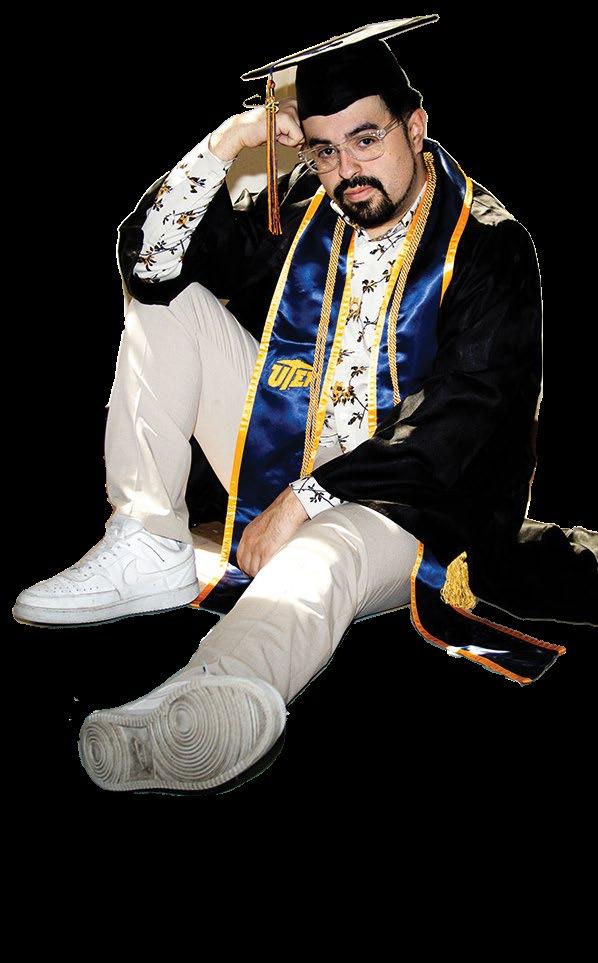
“There is more peer pressure from all your classmates. They use words you’ve never heard before or don’t know how to use in a sentence regularly,” Ugalde said. “When you participate, you feel like you have to use the same kind of vocabulary.”
Undergraduate studies, as a foundational stage in every student’s academic journey, often fosters a recurring sense of dislocation and encourages a habit of comparison.
Roberto Delgadillo is a student in his final year in the Master of Arts in Teaching English program and a high school teacher at Pebble Hills High School. He reflects on his academic journey and notes
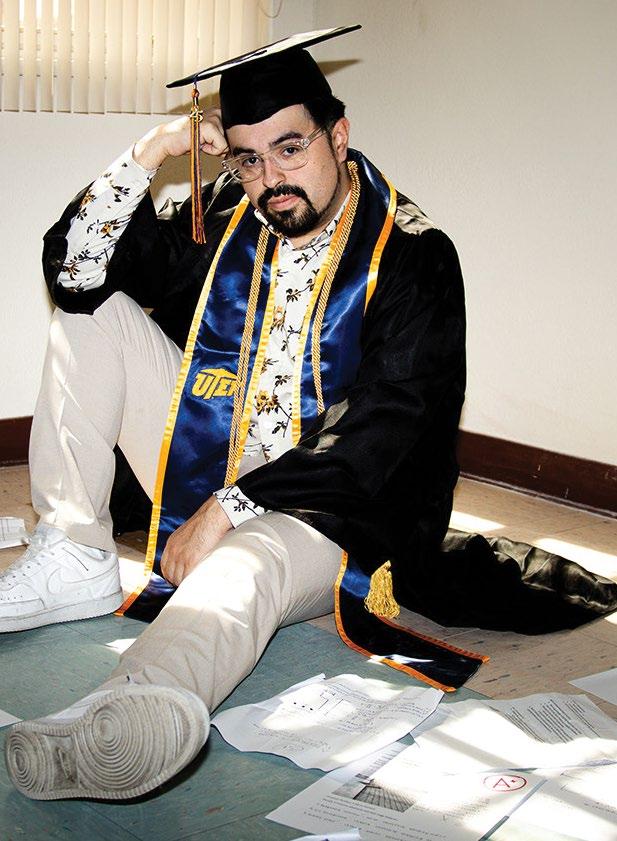
known to the public, thereby legitimizing their presence in all
I entered the program on my own and experienced imposter syndrome because people were older and more experienced than me,” Delgadillo said.
Delgadillo recalled an instance where he felt inclined to introduce himself to a class as someone he hopes is “capable of saying something smart” throughout the semester.
“I had to naturally see [undergrad] at first because now [in the graduate program] there’s a huge gap of knowledge to pull from when you’re reading so much each week that you just absorb so much of it passively. One day, you wake up and are using this kind of terminology,” Delgadillo said.
Participating can be intimidating, as the pressure to sound eloquent often outweighs authentic expression. This is
whether written or spoken has faced increasing criticism over the past 50 years for its tendency to complicate information.
Both students shared that, despite the prevailing stigma, the focus should shift away from constantly presenting oneself as an academic authority. Instead, they argue for prioritizing clarity and a deeper understanding of complex subjects.
“You can use a big word here and there, but overall, you need to make sure that your classmates and your professors understand what you’re trying to say. If not, then what’s the point of using all these big words if no one understands what you’re saying,” Ugalde said.
Similarly, there is a consensus that as a student, one’s responsibility is to make their knowledge accessible and
“As an educated brown person having this role in the community and being able to reach even family members right who don’t have that vocabulary, there’s some kind of responsibility that once we have the words, if you’re knowledgeable in a thing, you have authority to speak on it,” Delgadillo said.
As each semester brings in a new wave of students, the pressure to sound smart can be eased by recognizing that perspective is a valuable aspect of the classroom.
Incoming students can rest assured that while the pressure to conform by sounding “smart” prevails, sharing knowledge should be prioritized instead.
Sofia Sierra, editor
The spirit team at the University of Texas at El Paso (UTEP) notes its mission as striving to provide “a one-of-a-kind service and memorable experience” for the university and community to take pride in UTEP by being the essential connector of traditions, passion and loyalty. Director of Spirit Operations and Head Cheerleading Coach, Bianca Marquez, expands on UTEP Cheer’s role as the “connector.”
“It’s essential for us to be out in the community and connect our community with the campus, but it’s also important for us to be out on campus and connect students to the traditions and to the pride of UTEP,” Marquez said. “Besides basketball and football, we do cheer at volleyball, and we have the opportunity to go out during timeouts to perform. We also cheer at soccer, and we even go out to golf
tournaments and stunt around.”
Despite the common misconception that cheerleaders are for sidelines at games and an accessory to other sports, Marquez said the squad has their own goals, just like other teams.
“I really try to align my program with the policies of NCAA, like the other athletes. We don’t have games, but we still [have] practice just like anybody else, we go to workouts just like anybody else. They have trainers, just like other athletes,” Marquez said. “I feel that cheer has a combination of a lot of other sports. We do a lot of tumbling, like gymnasts do. There’s a lot of acrobatics involved, and we need to have a lot of agility, just like in basketball.”
Marquez’s team is in constant preparation for one big competition: Universal Cheerleading Association’s National competition. It is the most prestigious collegiate cheer competition in the country, this
year’s event hosted over 300 teams across 46 states.
“We [came] back from competition mid-January, and we are already trying to fix things that didn’t go well. For veterans, it starts right after competition, and for my incoming freshmen, it starts right after tryouts,” Marquez said. “We’re really a year-round program, and we never stop. But as we’re preparing for our competition, we’re also supporting other teams.”
Along with balancing competition and performing at games for other sports, UTEP Cheer also faces another unique battle. UTEP sports teams often struggle to draw the large spectator turnouts of many other universities, leading many to question the source of motivation for UTEP’s cheerleaders, Marquez said she combats this in two ways.
“We like to call it our ‘taglines.’ One is ‘Party on the sideline.’ I’m always telling [the team] that it doesn’t matter what’s happening



on the court or on the field – we need to have a party on the sideline. We cannot be affected by what’s happening on the court,” Marquez said. “The other thing I say to them is ‘Fake it ‘til you make it.’ We’ve had some games where we just didn‘t come out the victors, and fans leave. We remind ourselves that we’re preparing for competition. So, a lot of the elements that we do at the games, that’s what we do at competition. For us, it’s practice.”
With UTEP Cheer’s demanding schedule, Marquez also pushes her team for excellence off the mat.
“We make it a point here to always talk about transferable skills, like ‘Why do you need to be here on time?’” Marquez said. “Those are good habits that you need to build. We talk about communication and organizational skills, and those are a lot of things that I felt that I didn‘t really think about when I was an athlete.” Marquez participated in UTEP Cheer from 1996 to 2001. Her personal experience as an athlete influences much of her coaching strategy and her vision for the program. Reaching finals at the national competition will always be at the forefront, however, there are other aspects of student athletics
that Marquez emphasizes.
“My number one goal is making sure that I give opportunities to the students to be able to reach that vision that we have [of finals]. But so is giving them opportunities that they wouldn’t have not being in this program – opportunities to travel, opportunities to really learn about other cultures, and other parts of the U.S. and how it differs from where we live,” Marquez said. “I want them to graduate, and feel like they’re ready. If they graduate and they feel like they‘ve been successful in going out and seeking employment and finding a career, then I’ve done my job.”
For Marquez and her cheerleaders, it’s all about balance – and not just while they’re in the air. Whether it’s balancing competition preparation while supporting other athletes, or balancing life on and off the mat, Marquez aims to make sure her team is prepared for it all.

people that can help them.”
Behind the scenes of UTEP athletics, the sports medicine team plays an essential role in the athletes’ health and welfare.
Director of Sports Medicine
Andrew Ure has served in the role for three years and has been at UTEP for six years. Ure also works as the primary athletic trainer for the men’s basketball team. Ure said that the department handles every aspect of an athlete’s health.
“Whether they’re hurt in athletics and sprain their ankle at basketball practice, or I get a phone call at 11 o’clock at night saying, ‘Hey, I just accidentally kicked my wall and I can’t walk,’” said Ure. “All that funnels through us.”
In addition to providing physical care, the mental health issues that athletes tackle are handled by the sports medicine team.
“We have a volunteer sports psychologist if it has to do with performance,” said Ure. “If it’s an acute case like a crisis, we are the crisis managers, so, we’re the ones that are tracking a situation and then taking them directly to the
To spot trends and prevent injuries before they happen and identify times of the year when athletes are likely to become ill, the team takes part in the NCAA Injury Surveillance Program.
Despite efforts to prevent injuries, some are expected, especially in high-contact sports like football with large rosters.
According to Ure, student athletic trainers help the sports medicine team meet the needs of UTEP’s 17 NCAA sports teams.
“They’re crucial to what we do,” said Ure. “Without them, I don’t think we would run very smoothly.”
For junior Natalie Chong and senior Alejandra Valdo, both majoring in kinesiology, the program serves as a way to get experience in the sports medicine.
Student trainers work closely with the certified athletic trainers and get the opportunity to practice treating different kinds of injuries throughout the different sports as they switch yearly. Chong is currently working with the men’s basketball team while Valdo is working with football.
The work of the student trainers
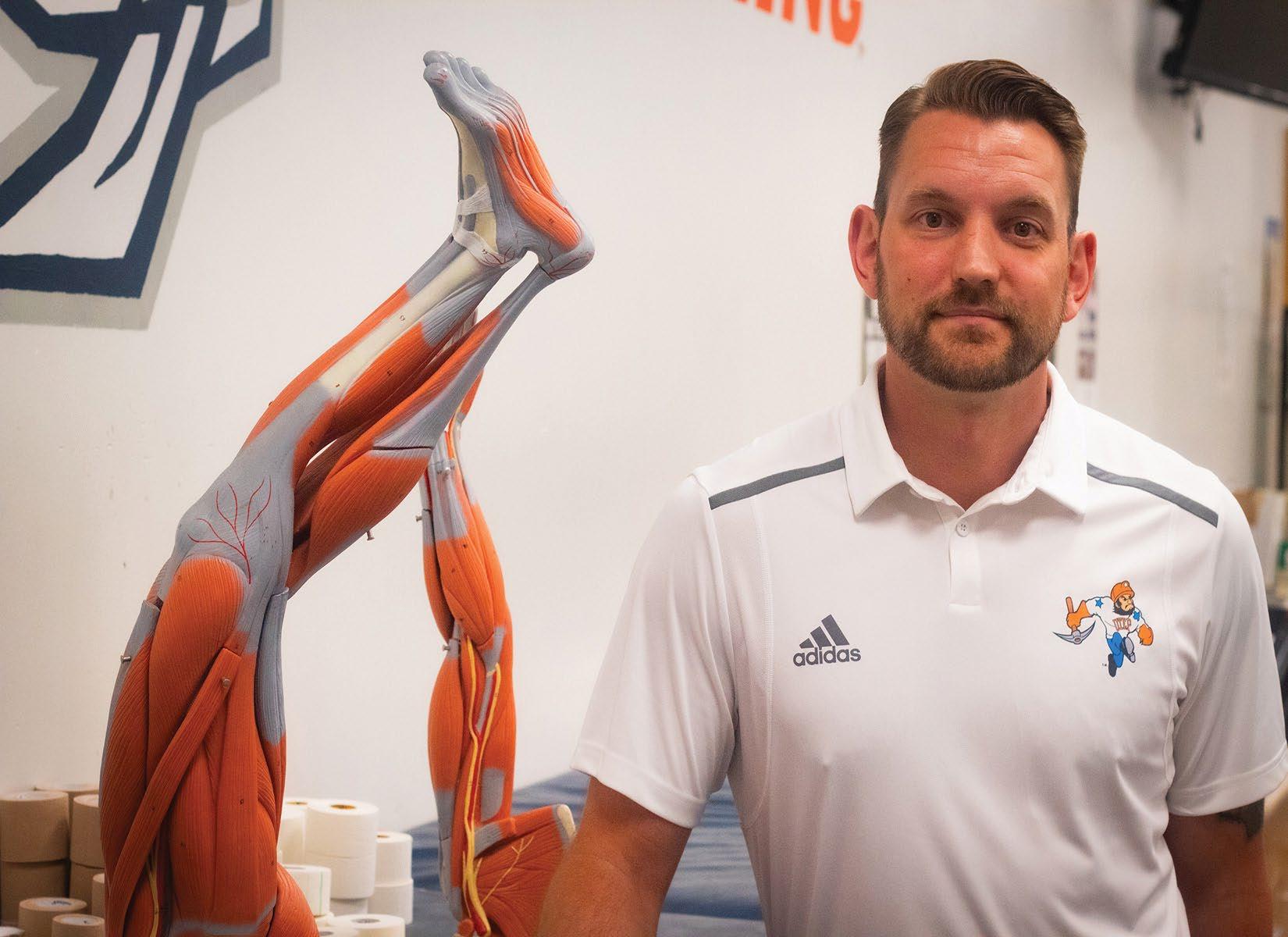
varies depending on sport and how long and comfortable they are providing treatment. Ure shared that more experienced student trainers may get the chance to write and perform the rehab treatment under the supervision of the certified trainers.
Both Chong and Valdo’s passion for the field of sports medicine came from personal experiences with injuries where they had to work with athletic trainers.
“I experienced my own injury, and I had to go through the same
process,” said Chong. “I saw what that trainer did for me and the process of coming back and doing the sport that I love, that’s what inspired me to join the program.”
Valdo said that while she did get treatment for her injury during high school, the UTEP sports medicine department offers more hands-on care to their athletes which motivated her to pursue this career path.
The program does have its challenges as student trainers have to balance work’s demands,
which can include traveling to away games, even with their busy academic schedules.
“This is a seven day a week job, and it’s normally 10 to 12 hours a day so, we have a long conversation with them about the responsibilities,” said Ure.
Given these responsibilities, balancing school with work takes time and effort.
“We have to be full time students, and its very much an experience that’s full time as well,” said Chong.
read MORE at theprospectordaily.com
Located behind UTEP Student Recreation Center’s, stands an impressive wooden structure that is part of the recreational sports department’s “Leadership Challenge Course” program.
The recreation center’s challenge course is a program designed to help teams take an intentional look
at group dynamics. Throughout the course participants work on teamwork, communication, planning and organization.
Alicia Coltrane, assistant director of the Outdoor Adventure Program for the Recreational Department, finds the course to be a learning experience for teams and groups who participate.
“Participants can expect a
challenging course to foster teamwork, communication, problem-solving, and leadership skills through activities,” Coltrane said. “Participants can expect to learn valuable information about themselves, each other, and the group as a unit, while also promoting confidence and a sense of accomplishment.” The course is divided into two
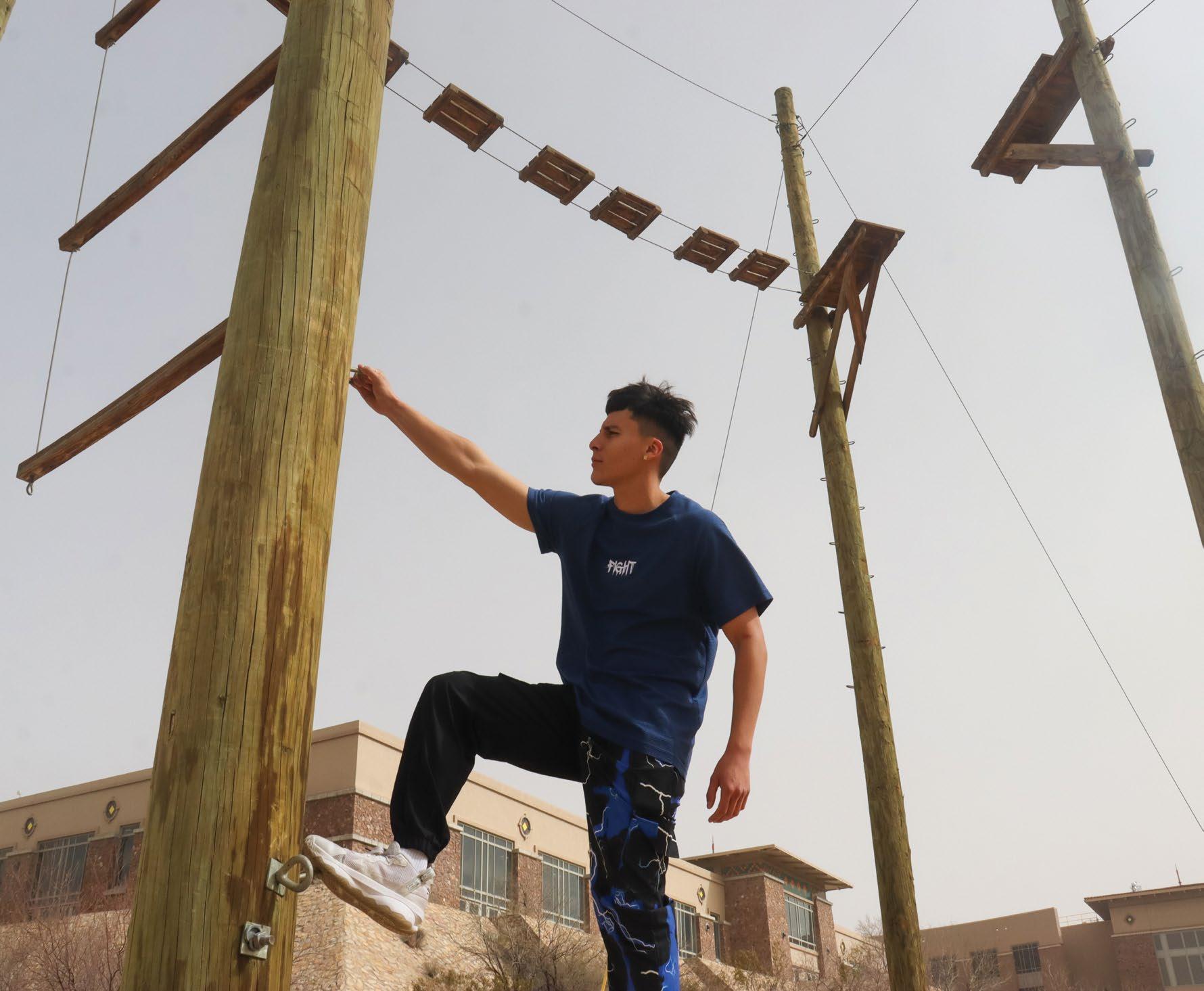
separate parts for a day. Groups can participate in either a full day of the leadership course, which is comprised of two team building activities or can sign up for a shortened version consisting only of one activity.
Part one of the challenge course is the team building challenge initiatives and part two is the high ropes course which is located behind the recreation center.
While participating in the activities, groups will explore different communication styles as well as see how different decisions are made for the group’s success.
In the team building activities individuals within the group will be required to take on guidance roles and explore styles of leadership.
Through these leadership roles participants in the group will also evaluate how their own leadership style affects the team as a whole.
Following the team building initiatives, groups then move on to the second portion of the challenge course, the high ropes area.
Participantes will climb to great heights while being supported by the rest of their group both verbally and physically. The main goal of the high ropes course is building trust within the group.
Teamwork and communication introduced during the first section of the challenge course are put into practice in the high ropes section.
Prior to climbing the wooden structures, recreation center employees instruct group members on proper safety instructions
ensuring that all participants enjoy themselves in a secure environment. By the end of the recreational sports department’s leadership challenge course, the program aims for participants to know the difference between the terms leadership and management.
The course will aid groups in improving team building skills, trust and belonging within the group. Finally, the challenge course will help individuals feel comfortable with voicing concerns and overall communication throughout the group.
Student supervisor at the recreation center Christian Garza has seen firsthand the positives participants leave with after completing the course.
“It really promotes team building and it promotes working together to accomplish a goal,” Garza said.
“A lot of participants are pleased with what they get out of the whole challenge course. People come in here and they’re scared of heights, or they struggle with trusting equipment or trusting each other.”
For students, groups and organizations interested in participating in the Student Recreation Center’s leadership challenge course, more information can be found at the recreational sports departments website: www. utep.edu/student-affairs/rsd/ Joseph Montero is a staff reporter for The Prospector and may be reached at jemontero@miners.utep.edu
Sporting events are part of every college experience, and games at the University of Texas at El Paso (UTEP) are no different. The roar of the crowd on a winning drive, the synchronized cheer after a 3-point shot made, or tense air in Memorial Gym on match point, these experiences can be enjoyed by all students at UTEP.
Despite this, stands at UTEP can look barren at times in comparison with other universities. Although the 2025 spring semester welcomed a record-breaking number of enrolled students – with a total enrollment of 23,861 – why are students not coming to games?
Full-time UTEP students receive free admission to all UTEP Athletics home ticketed events including football, men’s basketball, women’s basketball, volleyball, soccer and softball.
With these benefits gifted by the university, students can take advantage of the bonuses handed out to them.
Along with the already granted free tickets from the school, UTEP chemistry student Adrian Richarte, believes that sporting events on campus can be a great way to find
community as well.
and just get out of your comfort zone,” Richarte said. “It’s a new experience, and, it’s already part of our tuition, so we should take advantage of that.”
a sea of orange and blue, each and every fan can gain a sense of belonging and pride. People at the events are often in support of the UTEP Miners, and the community attending helps the “Miner Nation” come together. and fans community


